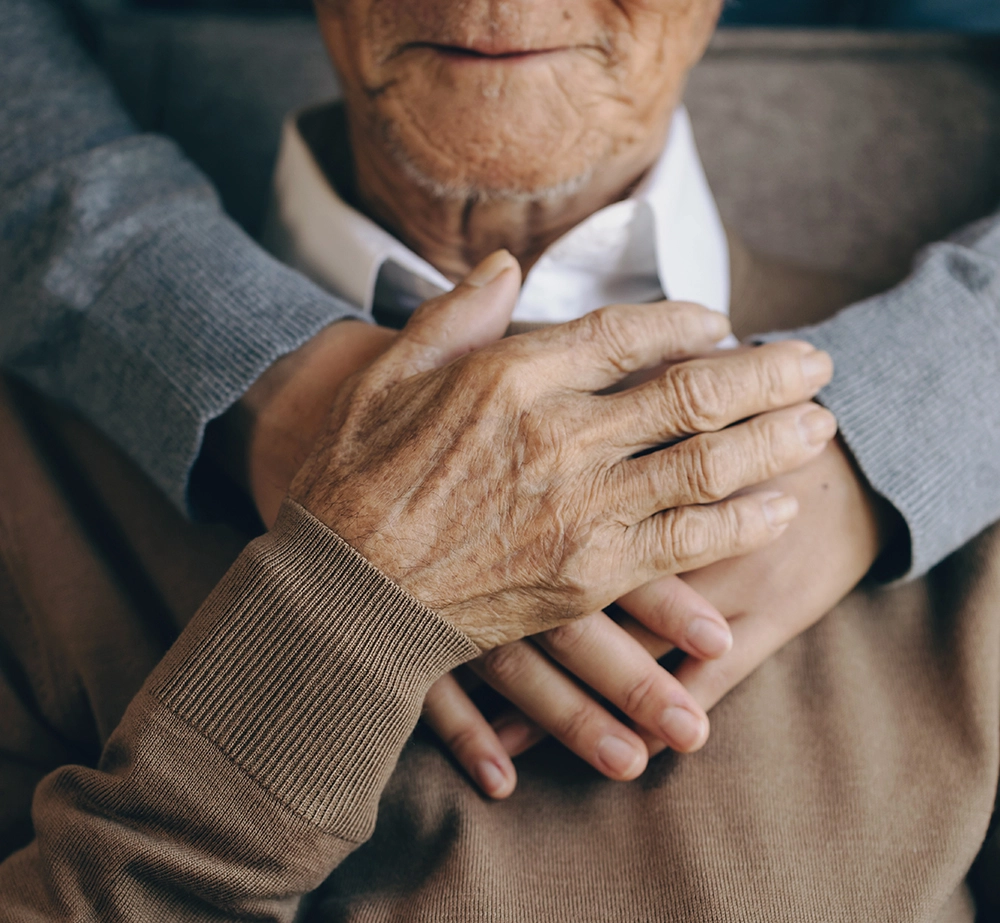Palliative Care to Ease Life
Are you or a loved one facing an incurable, progressive chronic illness, and/or potentially fatal disease, and looking for support for the best quality of life?
Palliative Geneva has gathered all the useful contacts and information so that you can easily find the support and assistance you need.

Palliative Care to Ease Life
Are you or a loved one facing an incurable, progressive chronic illness, and/or potentially fatal disease, and looking for support for the best quality of life?
Palliative Geneva has gathered all the useful contacts and information so that you can easily find the support and assistance you need.
PALLIATIVE CARE. FOR WHOM, WHY,
WHEN? WHO CAN BENEFIT FROM IT?
All sick people can request to receive palliative care, regardless of their age and diagnosis.
WHAT DO PALLIATIVE CARE
BRING ME?
Palliative care considers the person as a whole and does everything possible with the intention of preserving their quality of life within the limits imposed by the disease.
But what does this mean?
For a few weeks or even years, you have been living daily with a serious progressive disease that has a more or less long-term impact on your life expectancy.
Based on your needs, values, and life perspectives, professionals from various disciplinary fields working together (doctors, nurses, dietitians, physiotherapists, chaplains…) discuss with you and your loved ones about possible treatments, care, and support.
In this sense, palliative care contributes to making what is
unacceptable become “bearable” from moment to moment and to making the most of the remaining time to live.
It is with this perspective that palliative geneva provides you with this website where you will find various useful information directly answering your different questions or offering you links to other associative websites.

WHEN TO REQUEST a SPECIALIZED TEAM?
It is estimated that 80% of patients suffering from incurable, fatal and/or progressive chronic diseases have needs that can be met by implementing basic palliative care by their primary care physician and home care services, in nursing homes or in non-specialized hospital units.
As situations can become complicated, the use of specialized palliative care may become necessary more or less predictably and quickly. In order to stabilize a precarious situation or in case of difficult-to-manage symptoms, patients can:
- be cared for in units specially dedicated to palliative situations in hospitals
- benefit from follow-up by mobile teams traveling to the patients’ place of residence (home, nursing home, other institutions) or care (hospital) and whose role is to help caregivers improve the situation by advising and supporting them.
Here are some situations that frequently lead to needs for specialized palliative care:
- symptoms difficult to relieve
- family caregivers no longer able to handle an excessive burden
- family caregivers who are ill, exhausted or unavailable, or in social isolation
- severe anxiety, psychological distress of the patient, patient’s lack of understanding of their situation
- patient’s refusal of care
- aggression, agitation of the patient
- confused patient, not understanding that they are putting themselves in danger
- care and monitoring required exceeding the capabilities of the caregivers in charge
- ethical conflicts, care desired by the patient or relatives becoming inappropriate or a source of conflicts with the team in charge.

Last Aid Workshop
Death is a part of life, let’s talk about it!
The Last Aid workshops aim to raise awareness among participants about supporting their loved ones in their final moments of life, through 4 themes: death is part of life, anticipating and preparing, relieving suffering, saying goodbye.

DOCUMENTS AND INFORMATION FOR PATIENTS
AND LOVED ONES
CONCEPT AND PROGRAMS OF PALLIATIVE CARE
Explore the pages and download the content that interests you
Definition and History of Palliative Care
Palliative care supports the quality of life of patients and their loved ones in situations without the possibility of complete cure, which may be life-threatening.
It includes all measures of care, psychological, social and spiritual support useful for preventing and relieving symptoms and suffering.
It encourages the patient to make choices in order to anticipate complex end-of-life issues.
Learn more:
Definition and History of Palliative Care
National Strategy
The Confederation and the cantons have decided, within the framework of the “Swiss National Health Policy” platform, to promote palliative care in our country.
On October 22, 2009, the Swiss National Health Policy Dialogue adopted a “National Strategy for Palliative Care 2010 – 2012”.
Learn more:
National Strategy
Geneva Cantonal Program for the Development of Palliative Care
The Geneva Cantonal Program for the Development of Palliative Care 2020-2023 has been published.
cantonal_prog_palliative_care_2020-2023_final-version_september2019-2.pdf
LIVING WITH THE ILLNESS, ANTICIPATING
Pain Management
The information sheets developed by the HUG pain network help you understand pain treatments such as morphine.
Pediatric Palliative Care
End-of-Life Arrangements, Advance Directives
Every person has the possibility to anticipate how they wish to be cared for and accompanied at the end of life, as well as who will manage their affairs when they are no longer capable.
You will find explanations and models related to arrangements such as advance directives and power of attorney for incapacity in the documents in this section.
HUG Documents
FMH Document
Documents from the Swiss Academy of Medical Sciences (SAMS)
Attitude_towards_end_of_life_and_death_SAMS.pdf
directives_sams_PallCare_2013.pdf
Documents from the Cancer League
deciding-until-the-end-LCC.pdf
Living Better with Cancer
The information sheets developed by the HUG oncology service cover all topics related to cancer, from cancer-related symptoms to treatments and their effects.
ACCOMPANYING PEOPLE AT THE END OF LIFE
Guide for Bereaved Relatives
Guide for Bereaved Relatives
Accompanying People at the End of Life - Guide for Relatives and Volunteers
Accompanying People at the End of Life – Guide for Relatives and Volunteers
FREQUENTLY ASKED QUESTIONS
My Loved one with Advanced Illness No Longer Wants to Eat. I’m Worried. What are the Common Symptoms and Problems for Patients with Very Advanced Illness or at the End of Life?
Weakness or extreme fatigue, lack of appetite or disgust for food, pain, sleep disorders, shortness of breath, depression, anxiety are extremely common. These symptoms can be managed if the care team identifies these problems. Talk to the doctor and caregivers. Depending on the case, various professionals can be called upon: dietitian, physiotherapist, psychologist, etc.
It is necessary that nutrition-related issues be discussed in light of each patient’s therapeutic goals.
The occurrence of confusion is also extremely common. In case of unusual or incoherent speech or behavior, excessive drowsiness, reversal of day-night rhythm (patient active, awake at night, sleeping during the day), loss of attention, self-endangerment, talk to caregivers quickly to prevent caregiver exhaustion and look for causes and treat them.
Confusion requires urgent medical consultation, it can reveal an infection, dehydration, constipation, pain, other medical problems that are potentially more or less reversible. In all cases, treatment should be considered.
I Have Cancer. I Have many Questions about Cancer, Treatments, and the Support that Can be Offered.
Consult the HUG oncology service website and its thematic sheets on treatments, their effects, symptoms (nausea, pain, etc.).
I Feel I Need to Take Care of Myself to Cope with My Illness. I Would like to be Informed about Complementary and Non-Drug Therapies. Where Can I Find this Information?
Talk to your caregivers to explore together which therapy would suit you.
This may include acupuncture, osteopathy, sophrology, mindfulness-based stress reduction, therapeutic hypnosis, phytotherapy, homeopathy, aromatherapy, music therapy, Chinese medicine, Tai Chi, body image workshops, etc.
The OTIUM center supports you in living with or after cancer. Address: Place des Philosophes 18- 1205 Geneva. http://www.otium.center
My Loved one Wishes to Spend Their Final Days at Home. I’m Worried that Everything Will Rest on Me and that I Won’t Know how to Cope if There’s a Problem. How Can I Prepare?
Discuss this with the doctor who will come to your home to monitor your loved one. They will determine the necessary assistance to put in place to support you and relieve you as much as possible.
To help you cope, it’s useful to be informed about complications that may occur (anxiety, agitation, intense feeling of shortness of breath, fever, seizures in case of brain tumor or metastases, vomiting, etc.) to react in the best way. A plan will be established: who to call? What to do? Which treatments to give priority to? What will be the limits of home care?
Nursing follow-up will allow early detection of emerging problems by addressing them as soon as possible. Follow-up by a specialized consultation can be set up.
Most people surveyed would prefer to die at home. Despite this, many still die in a care facility where a team is present 24 hours a day. It is not appropriate to keep a patient at home when the limits of caregivers or family caregivers are exceeded.
My Father with Chronic Respiratory Disease is Hospitalized. I’m Having Trouble Accepting that He’s Being Transferred to Palliative Care Because He Has Bounced Back each Time.
It’s likely that after each complication, his health improved, but without actually returning to what it was previously.
In cases of diseases where health deteriorates slowly and progressively, it’s sometimes difficult to realize that the “evolution is happening very slowly but inexorably towards worsening. The patient functions despite increasing shortness of breath, adapting their activities, until” every movement costs them enormously, being short of breath even without doing anything. This situation has therefore been palliative for some time.
The increase and frequency of hospitalizations, difficulties in eating, weight loss, increasing sensation of shortness of breath, and intense fatigue are signs indicating that the situation is very advanced.
Palliative care does not consist of stopping treatments. Only treatments that no longer make sense for the patient are stopped after discussion.
Treatments that can improve comfort, especially respiratory comfort such as physiotherapy, will be continued or introduced. Morphine can help to be more comfortable and feel less short of breath.
My Loved one Has Expressed a Desire to Die. What Can Healthcare Providers Do?
“According to SAMS guidelines: When a patient declares that they wish to die, the care team must take this wish seriously and seek its reason. Whether expressed implicitly or explicitly, requests to actively end life are based on very different motivations. Patients are often ambivalent; they experience both the desire to continue living and the desire to die. Desires to die should be addressed openly and without judgment.”
“Similarly, if a patient requests assisted suicide, it is a desire to die that must be carefully evaluated.”
To learn more: Download the PDF file “Attitude towards the end of life and death” from the SAMS website
I’m Considering Stopping Intensive Treatments. Do I Have the Right to Refuse Them?
Yes, you have the right to refuse treatments that bring you more discomfort (e.g., intense fatigue, pain, nausea) and constraints than benefits.
Talk openly and simply to your doctor so they know what you’re experiencing right now. They can fully inform you about your situation and possible alternatives. Also talk to your loved ones and trusted individuals to be supported in this decision-making process.
My Loved one, Suffering from a Neurological Disease, Has Behavioral Problems, Often Falls, and is Sometimes not Very Understanding or Cooperative. I Feel Exhausted and Depressed. What should I Do?
In cases of diseases affecting the nervous system such as dementia, stroke with sequelae or poor recovery, Parkinson’s disease, Amyotrophic Lateral Sclerosis, or Huntington’s disease, home care relies heavily on the availability, physical and mental health, and support of caregivers.
Talk to the doctor about it.
If you don’t have home care assistance, it will be arranged. Associations specific to these diseases can help you. To learn more, click on the following link:
https://www.hug.ch/ressources-structures-soutien
If a network of home care providers is already in place, a respite stay can be planned. Additional help should be considered. Caregivers are available to support you socially, psychologically, practically, etc.
Hospitalization or placement in a nursing home may become necessary and should not be seen as a failure or abandonment, but as medium to long-term options that are prepared before a crisis or exhaustion occurs.
Is Palliative Care Intended for Patients other than those with Cancer?
Patients with diseases that severely impair the function of vital organs such as the heart, kidneys, liver, lungs, or brain may experience various unpleasant symptoms. As the duration and quality of life of these patients are reduced, they can benefit from palliative care.
To learn more: https://www.hug.ch/…/multimorbidites2016.pdf
My Father is Exhausted after Multiple Hospital Stays. He Would like to Spend His Last Days in His Nursing Home. Can We Plan ahead in Case of New Health Problems?
Yes, it is always better to anticipate new health complications, avoid stressful decision-making situations in emergencies, or even disappointment or conflict in case of differences of opinion between the patient, yourself, and the care team.
If your loved one is able to discuss these aspects and has not yet written advance directives, there is still time. Your help will be useful in doing so. You will find useful information in the following section: LIVING WITH YOUR ILLNESS / END-OF-LIFE ARRANGEMENTS
If you are this person’s therapeutic representative, you can meet with the care team to review the situation, discuss the person’s presumed wishes, and make decisions in their best interest regarding the approach to follow in case of new complications.
To learn more: https://www.hug.ch/directives-anticipees/representant-therapeutique